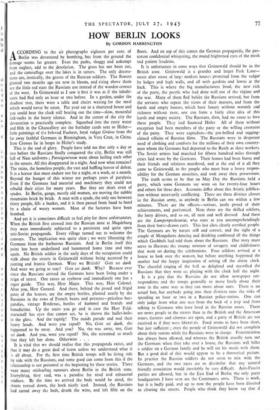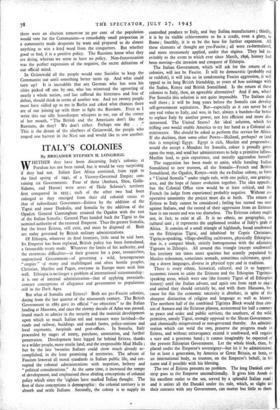HOW BERLIN LOOKS
By GORDON HARRINGTON
ACCORDING to the air photographs eighteen per cent. of Berlin was devastated by bombing, but from the ground the damage 'seems far greater. Even the parks, shaggy and unkempt from neglect, add to the desolation. The grass has not been cut, and the camouflage over the lakes is in tatters. The only decora- tions are, ironically, the graves of the Russian soldiers. The flowers planted two months ago are now in bloom, and rising above them are the little red stars the Russians use instead of the wooden crosses of the west. In Griinewald as I saw it first it was as if the inhabi- tants had fled only an hour or two before. In a garden, under the shadiest tree, there were a table and chairs waiting for the meal which would never be eaten. Put your ear to a shuttered house and you could hear the clock still beating out the time—slow, mournful tick-tocks in the heavy silence. And in the centre of the city the devastation is practically complete. Squashed into the rusty water and filth in the Chancellery are the birthday cards sent to Hitler— little paintings of the beloved Fuehrer, loyal vulgar Grosse from the far away faithful Germans in Birmingham, in Vera Cruz, in China. Iron Crosses lie in heaps in Hitler's study.
This is the end of glory. People have told me that only a day or two before the Russians finally conquered the city, Berlin was still full of Nazi uniforms ; Parteigenossen went about heiling each other in the streets. All this disappeared in a night. And now what remains? The ruins, the homeless people, the vast and baffling horror of defeat. It is a horror that must endure not for a night, or a week, or a month. Beyond the hunger of this winter are perhaps years of paralysis. Even if the Germans had material and machinery they could not rebuild their cities for many years. But they are short even of spades. In Berlin, gangs, mostly old women, are moving the rubble mountains brick by brick. A man with a spade, the only one between thirty people, fills a bucket, and it is then passed from hand to hand by a chain of weary women. Most of the factories have been bombed.
And yet it is sometimes difficult to feel pity for these unfortunates. When the British first crossed into the Russian zone at Magdeburg they were immediately subjected to a persistent and quite open anti-Soviet propaganda. Every village turned out to welcome the convoys. The implication was quite clear ; we were liberating the Germans from the barbarous Russians. And in Berlin itself this point has been underlined and hammered home time and time again. No British soldier in the early days of the occupation could walk about the streets in Grunewald without being accosted by a panting and frantic German. Were we British? Gott sei dank. And were we going to stay? Gott sei dank. Why? Because ever since the Russians arrived the Germans have been living under a reign of terror. One raises an eyebrow and immediately one has a eager guide. This way, Herr Major. This way, Herr Colonel. After you, Herr General. And there, behind the proud and frigid gates of the houses, are the empty bottles, planted neatly by the Russians in the rows of French beans and potatoes—priceless bur- gundies, vintage Bordeaux, bottles of kummel and brandy and benedictine. lip the stairs you go and in case the Herr Feld- marschall has eyes that cannot see, he is shown the bullet-holes in the glass. And the raphig! The maids parade and nod their heavy heads. And were you raped? No, Gott sei dank, she happened to be away. And you? No, she was away, too, Gott sei dank. And you, were you raped? No, she screamed so much that they left her alone. Otherwise . . .
It is vital that we should realise that this propaganda exists, and that it may do a great deal of harm unless we understand what it ;s all about. For tht first time British troops will be living side by side with the Russians, and some good can come from this if the relationship is not poisoned at the beginning by these stories. There were many misleading rumours about Berlin in the British zone. Everything, they said, was a paradise for tired and exhausted soldiers. By the time we arrived the beds would be aired, the sheets turned down, the hock nicely iced. Instead, the Russians had carted away the beds, drunk the wine, and left filth on the floors. And on top of this comes the German propaganda, the per- sistent confidential whispering, the round frightened eyes of the meek and patient frauleins.
It is unfortunate in some ways that Grilinewald should be in the British zone. Griinewald is a grander and larger Park Lane— street after street of large modern houses protected from the vulgar by lodges and high walls, and all with gardens and lawns at the back. This is where the big manufacturers lived, the new rich of the party, the people who had done well out of the regime and the war. Many of them fled before the Russians arrived, but from the servants who repeat the views of their masters, and from the harsh and empty houses, which have luxury without warmth and richness without taste, one can form a fairly clear idea of this harsh and empty society. The Russians, then, had no cause to love
these people. They had financed Hitler. All of them without exception had been members of -the party or the willing creatures
of the party. They were capitalists—the pot-bellied and sagging- chined villains of Russian films. The Russians were in desperate need of clothing and comforts for the millions of their own country- men whom the Germans had deported to the Reich as slave workers.
The Soviet armies had marched for fifteen hundred miles through cities laid waste by the Germans. Their homes had been burnt and their friends and relations murdered, and at the end of it all they came to Grunewald, to the people who must bear a heavy respon- sibility for the German atrocities, and took away their possessions. The truth seems to be that on May Day the Russians held a party, which some Germans say went on for twenty-four hours and others for three days. Accounts differ about this Asiatic jollifica- tion without necessarily conflicting. There are three distinct classes in the Russian army, as anybody in Berlin can see within a few minutes. There are the officers—serious, justly proud of their achievements, and puritanical. Next there are the skilled soldiers, the lorry drivers, and so on, all neat and well dressed. And there are the Lumpenproletariat, who stare at you uncomprehendingly from their horse-drawn carts. This last class clearly terrified people. The Germans are by nature stiff and correct, and the sight of a couple of Mongolians dancing and drinking confirmed all the things which Goebbels had told them about the Russians. One story must serve to illustrate the strange mixture of savagery and childishness that went on during the celebrations. Four soldiers arrived at a house to look over the women, but before anything happened the mother had the happy inspiration of setting off the alarm clock.
The cheerful ringing of the bell so delighted and mystified the Russians that they went on playing with the clock half the night. It is a pity that the Russians do not allow newspaper cor- respondents and the troops generally to move freely about their zone in the same way as they can move about ours. There is no actual ban, but anybody going into their districts runs the risks of spending an hour or two in a Russian police-station. One can only judge from what one sees from the back of a jeep and from talking to Germans who nave lived in the Russian zones. There are more people in the streets than in the British and the American zones, theatres and cinemas are open, and a party of British are not received as if they were liberaors. Food seems to have been short, but just sufficient ; even the people of Grunewald did not complain about their rations while the Russians were in charge. Fraternisation has always been allowed, and whereas the British usually turn out the Germans when they take over a house, the Russians will billet a soldier on a German family and he will eat his meals with them.
But a good deal of this would appear to be a theoretical picture. In practice the Russian soldiers do not seem to mix with the Germans, and the two races are so dissimilar that any natural friendly association would inevitably be very difficult. Anti-Fascist parties are allowed, but in the East End of Berlin the only party headquarters I have seen are the Communist ones. There is work, but it is badly paid, and up to now the people have been directed to clearing the streets. People who think they know say that if
there were an election tomorrow 20 per cent of the population would vote for the Communists—a remarkably small proportion in a community made desperate by want and prepared to do almost anything to win a kind word from the conquerors. But whether good or bad, it is a positive policy. The Russians know what they are doing, whereas we seem to have no policy. Non-fraternisation was the perfect expression of the negative, the secret defeatism of our official mind.
In Griinewald all the people would vote Socialist to keep the Communist out until something better turns up. And what could turn up? It is incredible that any German who has seen his cities picked off one by one, who has witnessed the uprooting of nearly a whole nation, and has suffered the bitterness and fear of defeat, should think in terms of another war. And yet twenty people must have sidled up to me in Berlin and asked what chances there are of our joining up with them to fight the Russians. Even as I write this our silly housekeeper whispers to me, out of the corner of her mouth, " The British and the Americans don't like the Russians, do they? We don't either. Perhaps one day . . ." This is the dream of the playboys of Grnnewald, the people who reaped one harvest in the Nazi sun and would like to sow another.



























 Previous page
Previous page